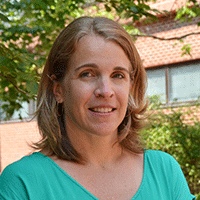Pettifor presents at UN’s ‘High-Level Meeting to End AIDS’
June 16, 2016
A UNC Gillings School of Global Public Health epidemiologist whose research focuses on social and structural drivers of HIV infection in sub-Saharan Africa was an invited speaker at the United Nations’ 2016 High-Level Meeting on Ending AIDS, held June 8-10 in New York City.
Audrey Pettifor, PhD, associate professor of epidemiology at the Gillings School and fellow at UNC’s Carolina Population Center, presented “An Overview of Evidence-Informed Approaches for Addressing Poverty, Inequalities and HIV,” during a June 7 side event focused upon “Action on Extreme Poverty and Inequality to End AIDS: Addressing HIV, Poverty and Inequality in Urban Settings.”
Speakers at the event included Luiz Loures, deputy executive director of UNAIDS, Ambassador Deborah Birx, U.S. Global AIDS Coordinator, and city delegations from Ukraine, Zambia and Haiti. Participants examined the role and potential of collaborative programming and rights-based responses to support the Fast Track Cities initiative, a U.N. effort to achieve the following targets by 2020:
- Zero discrimination and stigma for people living with HIV (PLHIV);
- 90 percent of PLHIV would know their HIV status;
- 90 percent of PLHIV would know their HIV-positive status on antriretroviral therapy (ART); and
- 90 percent of PLHIV on ART would achieve viral suppression.
At present, about 12.5 percent of people living with HIV in the United States do not know they have it. Globally, it is estimated that 54 percent of people who have the virus are not aware of their HIV-positive status.
About 70 percent of the 35 million people who have HIV live in sub-Saharan Africa, where much of Pettifor’s work is conducted. The aim of her current research is to identify modifiable risk factors and develop novel interventions to prevent new HIV infections – particularly among adolescents and young women.
“There is increasing recognition of the need to address structural factors such as poverty, education, gender-based violence, stigma and discrimination if we are to reach the UNAIDS goal of ending AIDS by 2030,” Pettifor said.
As part of the Fast Track Cities initiative, Pettifor and colleagues will be involved in evaluating innovative interventions to address structural factors that increase HIV risk in three cities – Port- au-Prince, Haiti; Lusaka, Zambia; and Kiev, Ukraine.
The U.S. Centers for Disease Control and Prevention has declared June 27 National “Get Tested” [for HIV, STDs and hepatitis] Day. Find free, fast and confidential testing by entering a zip code at GetTested.cdc.gov.
Note: HIV/AIDS statistics are available at cdc.gov and unaids.org.
Gillings School of Global Public Health contact: David Pesci, director of communications, (919) 962-2600 or dpesci@unc.edu

